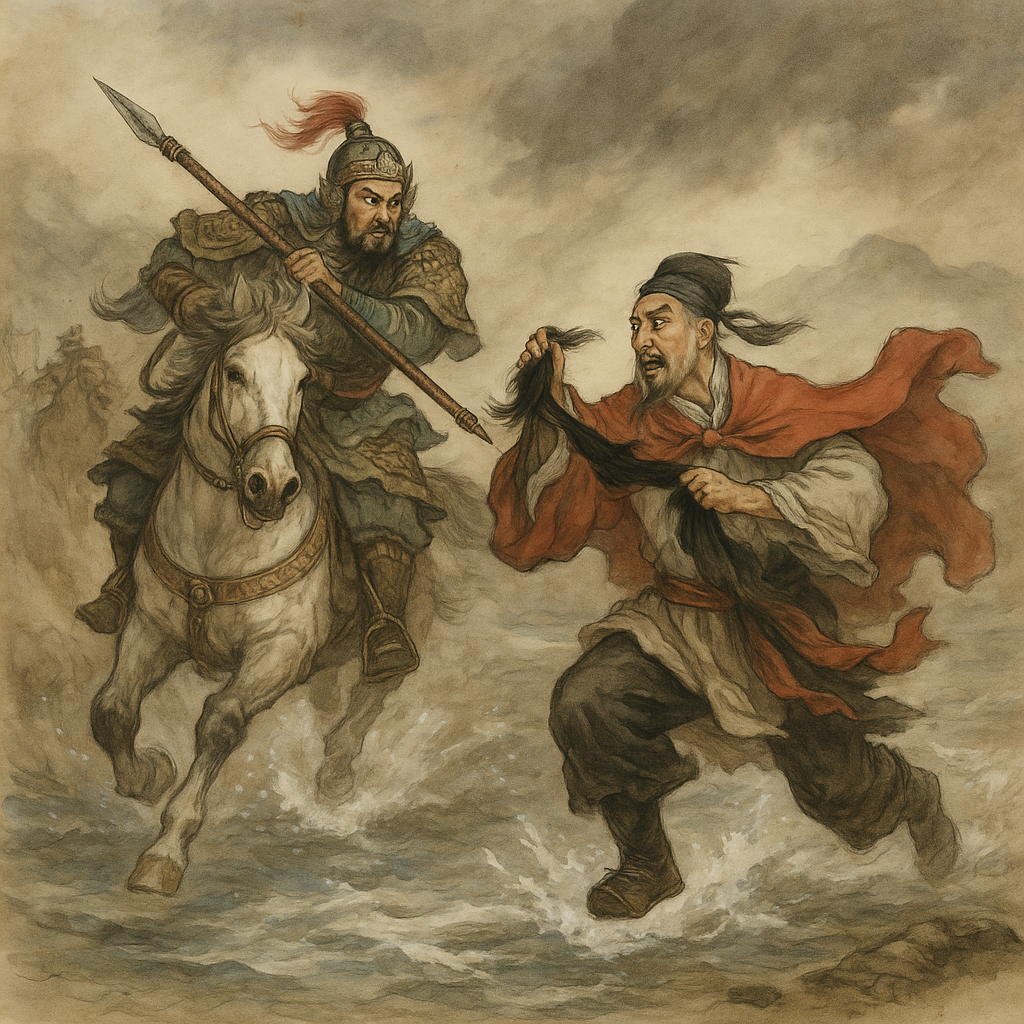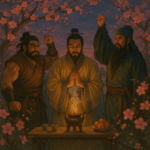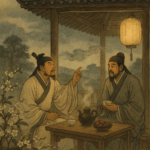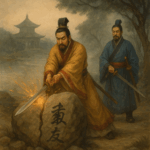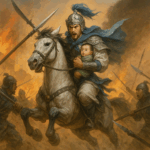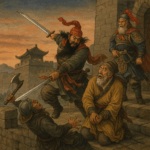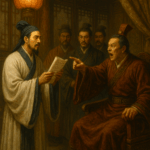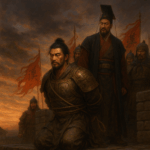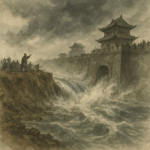It was Chen Qun, Gentleman of the Writing Academy, styled Changwen, who first proposed the scheme. Cao Cao asked, “Master Changwen, what do you advise?” Chen Qun replied, “Now that Liu Bei and Sun Quan are as united as lips and teeth, if Liu Bei moves against Yi Province, Your Excellency could dispatch your armies under General Zhang Liao, join forces with the troops of Fei, and march straight into the Jiangnan region. Sun Quan would have no choice but to call on Liu Bei for aid—but Liu Bei’s heart lies in Yi, not in rescuing Wu. Deprived of Liu Bei’s support, Sun Quan’s forces would weaken, and Eastern Wu would fall to you. Once Jiangnan is secured, Jingzhou could be pacified in a single stroke. Only then would Yi Province be within reach—and the empire would be yours.” Cao Cao nodded, “Your words align perfectly with my intent.” He immediately raised three hundred thousand troops, ordered Zhang Liao to prepare provisions, and marched south toward Wu.
His spies soon carried word of these movements to Sun Quan. The king convened his generals to deliberate. Zhang Zhao advised, “Dispatch a messenger to Lu Su at Chaisang. Have him send an urgent letter to Jingzhou, asking Liu Bei to help resist Cao Cao. Su’s counsel carries weight with Liu Bei, and as Wu’s son-in-law, he cannot refuse. If Liu Bei comes to our aid, Jiangnan will be safe.” Sun Quan agreed and sent a letter to Lu Su, who at once penned a missive to Liu Bei. Liu Bei read it, left the envoy in his guesthouse, and sent for Zhuge Liang. When Zhuge Liang arrived and examined Lu Su’s letter, he said, “There is no need to deploy troops from Wu or Jingzhou. We only need to convince Cao Cao that he cannot ignore the southeast.” He sealed his reply to Lu Su, assuring him that only a northern threat would require Liu Bei’s careful strategy, and the envoy departed.
Liu Bei asked, “Cao Cao has raised three hundred thousand men and joined forces with Fei—how shall we repel him?” Zhuge Liang answered, “Cao’s greatest fear has always been the forces of Xiliang. Having slain Ma Teng, he must dread Ma Chao taking command of Xiliang’s armies. You should write to Ma Chao, inviting him to lead his troops through the passes—then Cao Cao will have no time to march on Jiangnan.” Delighted, Liu Bei immediately drafted a letter and sent his most trusted envoy straight to Xiliang.
Meanwhile, in Xiliang, Ma Chao awoke from a frightful dream. He dreamed he lay in snow, surrounded by a pack of tigers. Startled awake, he summoned his officers to relate the vision. A veteran captain named Pang De, styled Lingming, said, “In our lore, snow and tigers foretell grave misfortune. Might my lord have suffered some harm at Xu Chang?” Before he could finish, Ma Chao’s younger brother Ma Dai burst in, prostrate and weeping, “Uncle and our elder brother have been executed!” Ma Chao recognized him at once. Ma Dai explained, “They conspired with Censor Huang Kui to assassinate Cao Cao. The plot was exposed; they were beheaded in the marketplace. Only I escaped, disguised as a merchant.” Ma Chao, enraged, fell to the ground, then rose, teeth clenched, vowing vengeance on the traitor Cao.
Just then a messenger arrived from Jingzhou bearing Liu Bei’s letter, which read in essence:
The Han has suffered under Cao Cao’s tyranny. My late father and I once shared a secret imperial decree to eliminate him. Now that he has slain my father, I cannot rest while he lives. If you, General Ma, would lead Xiliang’s forces against Cao’s right flank, I will muster Jing and Xiang’s troops to block his front—then we can capture him, eradicate his faction, avenge our kin, and restore the Han.
Moved, Ma Chao wept, wrote his reply, and sent the messenger back. He then summoned Xiliang’s armies and prepared to march. But first, Governor Han Sui sent for him. At Han Sui’s residence, Ma Chao showed him Cao Cao’s letter offering him the title Marquis of Xiliang if he would surrender to Xu Chang. Ma Chao prostrated himself and begged Han Sui to give up the heavy burden of war and escort his brothers safely to Xu. Han Sui rose him, “As your father’s sworn brother, I could not harm you. If you raise your banners, I will lend you my support.” Ma Chao bowed his thanks.
Han Sui executed Cao’s messenger, then mustered his eight tribal divisions—led by Hou Xuan, Cheng Yin, Li Kan, Zhang Heng, Liang Xing, Cheng Yi, Ma Wan, and Yang Qiu—joining Ma Chao’s own officers Pang De and Ma Dai. Together they raised two hundred thousand troops and swept southeast on Chang’an.
At Chang’an, Governor Zhong Yao sent word to Cao Cao, who led his forces out to meet the enemy on the plains. Ma Dai, leading the vanguard of fifteen thousand, rolled down upon them like a tide. Zhong Yao gallantly met him in single combat—but was routed and fled. Ma Chao and Han Sui’s main host arrived and surrounded Chang’an. The city, with its solid walls and deep moats, withstood ten days of siege. But Pang De had observed that Chang’an’s fields were salt-ridden and its inhabitants without firewood or grain. He proposed, “If we lift the siege and withdraw, the city—already weakened by hunger—will fall into our hands.” Ma Chao accepted the plan. He raised the ‘order’ banner, had the troops withdraw, and personally covered the rear. By dawn, Zhong Yao peered over the walls to see the enemy gone, though he wisely kept the gates closed.
On the fifth day, scouts reported the enemy’s return. The townspeople rushed to open the gates—but Zhong Yao closed them again and held firm.
Meanwhile, Zhong Yao’s younger brother Zhong Jin guarded the west gate at midnight when a fire broke out within the walls. Racing to douse it, he was ambushed by Pang De, who shouted, “Pang De is here!” Struck unawares, Zhong Jin fell from his horse. Pang De cut the locks, scattered the garrison, and flung open the gates, admitting Ma Chao and Han Sui’s troops. Zhong Yao climbed the eastern walls and fled. Ma Chao and Han Sui celebrated a great victory.
Zhong Yao retreated to Tong Pass and sent urgent dispatches to Cao Cao, who realized that losing Chang’an made any further southern campaign impossible. He summoned Cao Hong and Xu Huang: “Take ten thousand men to reinforce Zhong Yao at Tong Pass. If you lose it within ten days, you die; if not, your fate shall rest with me.” They set out that very night. General Cao Ren cautioned, “Hong’s hot temper may prove dangerous.” Cao Cao answered, “You and I will escort the provisions—let them follow.”
At Tong Pass, Cao Hong and Xu Huang held the defenses without sallying forth. Ma Chao came to its base and hurled insults at the Cao household. Hong was enraged and prepared to lead a sortie—but Xu Huang stopped him: “This is Ma Chao’s ploy to draw you out. If we hold firm until the Chancellor arrives, victory will be ours.” For nine days Ma Chao’s troops jeered and taunted from the walls; Cao Hong endured, restrained by Xu Huang’s counsel.
On the ninth day, the enemy, weakened by weather and fatigue, left many horses tethered outside as they slept. Seizing the chance, Cao Hong led three thousand cavalry in a daring night raid. The startled Xiliang soldiers abandoned their mounts and fled; Hong pursued them. Xu Huang, seeing Hong’s advance, hurried forward to cover him, shouting him to fall back. Suddenly, Ma Dai burst in, followed by Pang De and a larger force coming from both flanks. Cao Hong and Xu Huang, badly outnumbered, fought their way back into the pass. The Xiliang troops pressed in but were driven off when reinforcements under Pang De and Ma Chao arrived to rescue them. The two sides clashed until dusk, with Cheng Yin and Zhang Heng among the casualties.
Reviewing the losses, Ma Chao and Han Sui lamented that if Cao Cao built fortifications on the Wei’s north bank, their advance would stall. They resolved to launch a night raid on the enemy’s encampments. Dividing their forces, Ma Chao led the vanguard while Pang De and Ma Dai guarded the rear.
Meanwhile, Cao Cao had his men fortify the north bank with three camps—Cao Ren on the left, Xiahou Yuan on the right, the Chancellor himself in the center. He instructed his officers: “If they attempt to raid the camp, we will spring the ambush. When the signal fires sound, our hidden troops will rise and capture them at a stroke.” The officers complied, ambushes were set, and all was ready.
That very night, Ma Chao sent Cheng Yi with thirty horsemen to scout ahead. Finding no sign of Cao Cao’s forces, Cheng Yi rode straight into the central camp—whereupon Cao Cao’s signal cannons thundered, and hidden troops swarmed out, slaughtering the thirty. Cheng Yi was cut down by Xiahou Yuan.
Then Ma Chao, Pang De, and Ma Dai attacked in three columns from the rear, scattering Cao Cao’s forces. The fateful moment arrived:
Though ambush may lie in wait for foes,
none outmatch the vanguard’s eager blows.
Their fate remains to be revealed in the next chapter.
